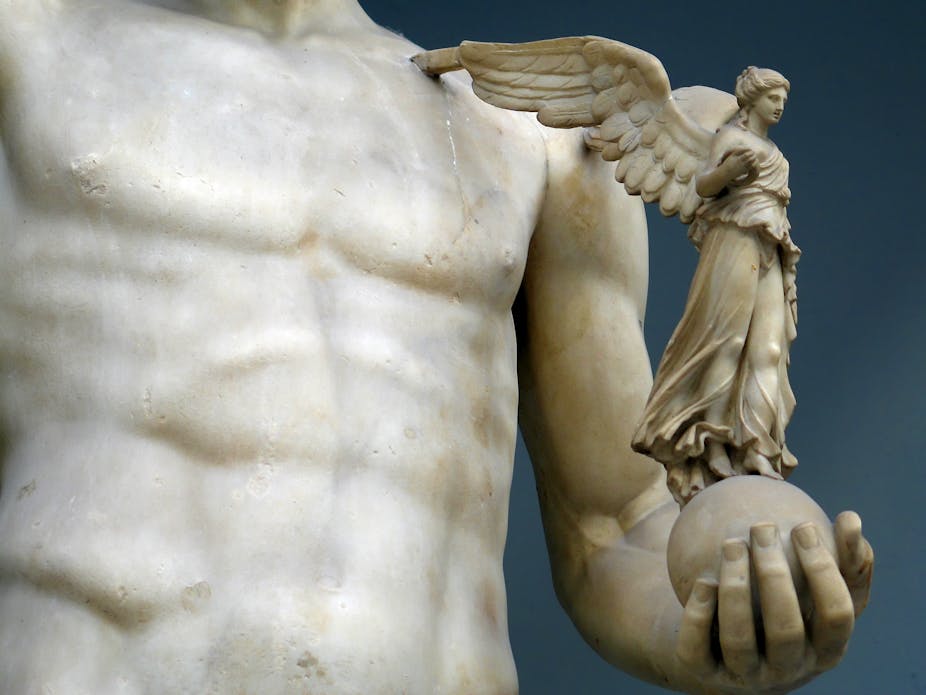If you had to argue for the merits of one Australian book, one piece of writing, what would it be? Welcome back to our occasional series in which our authors make the case for a work of their choosing. See the end of this article for information on how to get involved.
Way back in 1990 our very own Colleen McCullough – that earthy Norfolk Islander famed for her bestselling cassock-ripper The Thorn Birds (1977) – declared to the world there was more to her mettle than forbidden-love-with-a-dog-collar. The proof was in the penning and publishing of The First Man in Rome.
A more starkly different book she could not have given us and legions of Thorn Birds fans thought she’d gone off in the sun. Fortunately, legions of about-to-be-fans who wouldn’t have touched The Thorn Birds wearing asbestos gloves discovered she’d produced a masterpiece. I was one of them, and so, I’m led to believe, were several US Presidents, inhaling or otherwise, along with prime ministers various from Blighty to Oz.
The reason First Man gained Our Col a whole new fan base was this: it was an epic excursion in power. The gaining, the maintaining, and the keenly felt loss of power combined to form the overarching theme of the work, and so magnificently did the novel explore its subject, with madness, murders and scheming by the score.

A better novel on power I have not read since – or rather a better series of novels. The First Man in Rome was the first of seven big books McCullough penned detailing the triumphant rise and calamitous fall of the Old Roman Republic.
The characters were already best friends to anyone who had a classics education. For those, like me at the time, who were somewhat more self-educated in the history of Ancient Rome, and therefore rarely strayed beyond the maniacs, those Old Republicans were a revelation.
As briefly as I can summarise it, given it runs to 900 pages, First Man concerns the ascent of Gaius Marius, a new-money pleb provincial with such an uppity itch. Despised by the silver-spoons for his ineptitude with a fish knife, big-fisted Marius gives not a fig what they think, and in doing so wins the hearts of all New World readers, for whom this attitude towards Old World snobberies strikes rather a lot of chords.
Running parallel to Marius is sexy Lucius Sulla, a died-in-the-wool blue blood of cast iron lineage and not one brass razoo. He’s a celebrated shag, however, sleeping his way to the finer things, in the course of which he throttles some of his lays – all in a day’s work when a Roman’s got ambitions to realise.
Following fortuitous wedlock with a babe from a broke-yet-aristo family, Marius moves easier in the circles he aspires to, which is when he lands himself a plum gig: he gets to General up an army and in the process wage a war. And who should end up as his subordinate but sex-on-legs Sulla? Two storylines neatly collide.

What follows is a saga of friendship and loyalty between two cosmically ambitious, preternaturally capable men, each of whom is outside the toga party hungrily looking in. The Roman feast becomes theirs to savour in due course, or rather it becomes Marius’s. He attains the post of Consul – as good as things got in pre-Imperial times – and stays there a record six terms.
In his shadow is loyal Sulla, his friend to the end, until the sestertii drop that he’ll never attain such heights of his own while his best mate sits in the swivel chair. Thus are sown the seeds of betrayal.
If all this sounds vaguely familiar, it should. Squint a bit and it’s Hawke and Keating, Howard and Costello, Blair and Brown. First Man is a universal story about companionship and power and how those two great concepts, so tragically for Rome, are forever mutually incompatible.
Unlike the swords, sandals, sex and sin sub-genre of novels about the Eternal City (a lusty library to which I confess to having contributed two novels myself), McCullough’s First Man is an orgy-free zone. Readers seeking bacchanals, bonking and big bouncing boobs of debauchery should look elsewhere.
This is Rome before the rot set in, before it got too louche for its loincloth. This is Rome with ideals – conservative, yes; imperfect, most definitely – steered by high-minded, honourable men striving and self-sacrificing for the greater good. Misfortune only comes when those individual definitions of what is “good” prove differing.
The First Man in Rome is an Australian classic. At first glance there’s absolutely nothing Australian about it at all. At second glance it is our story absolutely – and the story of every other Western and would-be-Western nation for whom democracy is cherished or aspired to.
This is the real message of McCullough’s great book, and the six books that follow it: democracy is deeply defective but it’s all that we have, and the alternatives, as the Romans discovered to their cost, are considerably less desirable.
Are you an academic or researcher? Is there an Australian book or piece of writing – fiction or non-fiction, contemporary or historical – you would like to make the case for? Contact the Arts + Culture editor with your idea.
Further reading:
The case for David Ireland’s The Glass Canoe
The case for Capital, Volume One by Anthony Macris
The case for Gularabulu by Paddy Roe
The case for The Fortunes of Richard Mahony by Henry Handel Richardson
The case for Kim Scott’s That Deadman Dance
The Case for John Bryson’s Evil Angels
The case for Henry Handel Richardson’s The Getting of Wisdom
The case for Sheilas, Wogs and Poofters by Johnny Warren
The case for The Ghost’s Child by Sonya Hartnett

